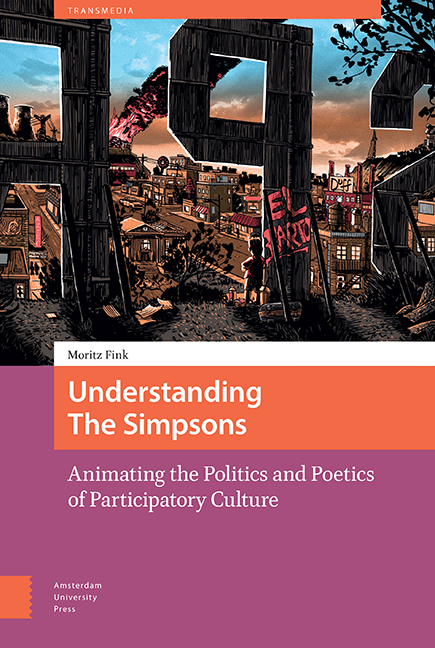Book contents
- Frontmatter
- Dedication
- Contents
- List of Images
- Acknowledgments
- Preface to the AUP Edition
- Introduction
- 1 Bart Talks Back: The Politics and Poetics of Participatory Culture
- 2 Alternative TV: The Genesis of The Simpsons
- 3 More than Just a Cartoon: Meta-Television Culture and the Age of Irony
- 4 High Fives on Prime Time: Representing Popular Culture
- 5 At the Edge of Convergence Culture: Engaging in the Simpsons Cult
- 6 Echoes of Springfield: The Simpsons in Remix Culture
- Conclusion: The Simpsons, Cultural Feedback Loops, and the Case of Apu
- Bibliography
- Index
4 - High Fives on Prime Time: Representing Popular Culture
Published online by Cambridge University Press: 21 October 2021
- Frontmatter
- Dedication
- Contents
- List of Images
- Acknowledgments
- Preface to the AUP Edition
- Introduction
- 1 Bart Talks Back: The Politics and Poetics of Participatory Culture
- 2 Alternative TV: The Genesis of The Simpsons
- 3 More than Just a Cartoon: Meta-Television Culture and the Age of Irony
- 4 High Fives on Prime Time: Representing Popular Culture
- 5 At the Edge of Convergence Culture: Engaging in the Simpsons Cult
- 6 Echoes of Springfield: The Simpsons in Remix Culture
- Conclusion: The Simpsons, Cultural Feedback Loops, and the Case of Apu
- Bibliography
- Index
Summary
Abstract
An important reason for The Simpsons’ impact and longevity as a media franchise has been the show's dedication to representing popular culture. From film and television history to sci-fi and comics culture, from rock music to street art—popular culture has provided The Simpsons with a wealth of figures, narratives, and themes to convert (sub)cultural capital into commercial entertainment. As this chapter shows, one particularly prominent domain of popular culture that The Simpsons invested in was media fandom. Positive depictions as well as mockery of media fans (including Simpsons fans) created both gestures of affiliation and discipline that have targeted the tastes of fan consumers as a valuable audience group for Fox and the Simpsons series.
Keywords: The Simpsons, popular culture, media fandom, convergence culture
In her analysis of TV phenomena in the post-network era, Amanda Lotz (2014) has drawn on Newcomb and Hirsch's concept (1983) of the “cultural forum,” according to which a television text raises a range of questions, contradictions, conflicts, and ideas that coexist and compete with each other within liberal societies. Popular TV comedies of the broadcast era succeeded in drawing a heterogeneous audience by operating as such a cultural forum. Lotz gives the example of All in the Family, which alternatively challenged and reinforced different worldviews through the show’s antagonism between the characters Archie and Meathead (p. 44). In the post-network era, ushered in by the arrival of MTV as well as Fox's “edgy” shows, television began to work increasingly in terms of what Lotz dubs a “subcultural forum,” as a discourse “among more narrow groups that share particular cultural affinities or tastes.” Networks like MTV and Fox, and shows like Married… with Children and The Simpsons thus provided “the lingua franca for adolescents and operat[ed] as ‘must-see TV’ in order for teens to achieve cultural competence” (ibid., pp. 47–48).
In the previous chapter, I have discussed the extent to which The Simpsons reflected Gen Xers’ meta-television culture as one element for the series’ success. This chapter sheds light on the ways the show succeeded as a “subcultural forum” and “must-see TV” for a significantly hybrid audience in the early 1990s. For this purpose, I will analyze stylistic characteristics of The Simpsons, such as its fast-paced, strident aesthetic and the role of soundtrack.
- Type
- Chapter
- Information
- Understanding The SimpsonsAnimating the Politics and Poetics of Participatory Culture, pp. 109 - 130Publisher: Amsterdam University PressPrint publication year: 2021



